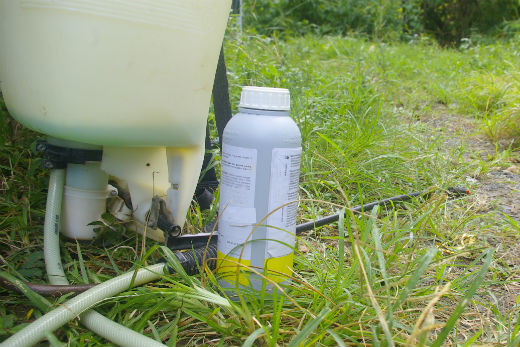Glyphosate, more commonly known as RoundUp, remains the safest and most effective week control chemical, provided it is used as directed, says Bill Jackson of Papamoa, who was involved in early trials of the product in New Zealand.
Bill is concerned public pressure may encourage Western Bay of Plenty District and Tauranga City councils to use less effective, and but costly weed control measures, including hot water and salt water sprays, instead of RoundUp.
'I well remember back in the mid-1990s when council used hot water and salt water sprays at Papamoa. They spent a lot of money on specialist equipment and although the sprays initially killed the leaves of weeds, they didn't kill the roots and the weeds quickly grew back.
'Roundup/glyphosate is certainly a lot safer and far less expensive than what ‘Do Gooders' want councils to revert to with hot water spraying to control the weeds within both our councils.”
Bill says his views of the safety of the chemical are backed up by a report in the newspaper the UK Farmers Guardian which quotes the European Food Safety Authority as saying glyphosate is 'unlikely to cause cancer in humans”.
However, the EFSA's peer review which assessed the active ingredient in the chemical did recommend a new exposure limit safety measure regarding glyphosate residues in food.
Crop Protection Association is quoted in the article as saying numerous health assessments during 40 years concluded there was no risk to human health, when the product was used correctly.
The article also quoted the Soil Association, which has been campaigning to stop glyphosate being sprayed on wheat destined for use in UK bread, as pointing to a World Health Organisation's International Agency study which found the chemical was 'probably carcinogenic to humans”.
Bill says he welcomes the findings of the EFSA and has sent the article to councillors in the hope they will continue to allow the glyphosate/Roundup to be used for weed control in reserves and along roads sides.
Bill was farm supervisor for J.Wattie Canneries and then advisor in agrochemicals and seeds for Shell Chemicals for many years before changing directions into property development.
'I had a lot to do with the early development of Roundup/glyphosate undertaking many spraying trials myself both aerial and ground on established willow trees along rivers as well as barberry/blackberry control right through to its many uses with farmers and councils.”
There are concerns about resistance to RoundUp with the first New Zealand case of glyphosate resistance confirmed in annual ryegrass on a Marlborough vineyard.
Mike Parker, the project manager for the Avoiding Glyphosate Resistance team, says glyphosate is the most frequently used herbicide in New Zealand agriculture and although there have been some anecdotal reports of resistance, this is the first confirmed occurrence. Mike says the resistance finding should provide a wake-up call for all users of the broad spectrum weed killer.
Resistance means that some individuals in the target species have developed a means of avoiding the effects of the chemical.
Foundation for Arable Research CEO Nick Pyke says this is a warning to users of glyphosate that they need to be aware of the danger of resistance developing and be careful how they use it.
He says glyphosate is one of the most environmentally friendly herbicides on the market, and the repercussions of losing the use of it would be serious.
Bill remembers cases of blackberry being apparently resistant to the chemical in Northland and coastal Gisborne many years ago.
'It was found that sea sprays had provided a protective coasting over the leaves of the plants, so Monsanto developed a penetrating agent which ensured the glyphosate got into the plant, and that worked.”



3 comments
Safe ??
Posted on 03-02-2016 19:22 | By space cadet
Effective is the plus side of Roundup but as to safety I doubt in the sheer quantities consumed in the food industry it could be described as such. Used to kill off wheat growth for early harvesting?? Unfortunately, glyphosate is linked to cancer (Group 2A
get the true facts
Posted on 04-02-2016 09:26 | By tundra
Glyphosate remains in the soil forever where ever it is sprayed!the only time it moves if the land slips away or subsides etc.So safe?I don't think so!
Get the beneficiaries working
Posted on 04-02-2016 10:24 | By Annalist
We wouldn't need sprays if all those on unemployment and sickness benefits did some weeding in return for their payments. Good idea?
Leave a Comment
You must be logged in to make a comment.